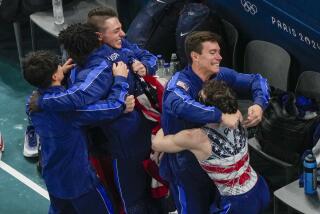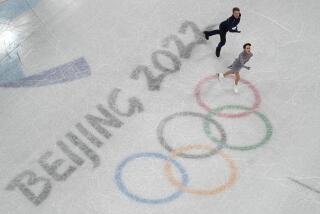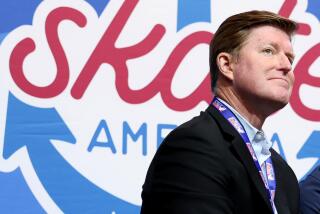WINTER OLYMPICS : Men’s Figure Skating : Boitano Has the Lead; Orser Is Now Second After Fadeev Falters
- Share via
CALGARY, Canada — Ever since they arrived here for the Winter Olympics, the two Brians--Boitano of the United States and Orser of Canada--have insisted that they are not the only men capable of winning the figure skating gold medal and that the Soviet Union’s Alexander Fadeev also should be considered among the favorites.
But after Thursday night’s short program at the Corral, Boitano and Orser, like virtually everyone else, can begin concentrating on the Battle of the Brians.
Boitano, the four-time U.S. champion and the 1986 world champion from Sunnyvale, Calif., moved into first place after his second-place finish in the short program, while Orser’s victory in the short program moved him into second place.
As for Fadeev, he was not even the best Soviet Thursday night, finishing ninth in the short program. He is in third place overall, but he cannot win unless both Boitano and Orser skate like the hapless French hockey team in Saturday’s long program, which counts toward 50% of the final score.
That is not likely to happen considering how well Boitano and Orser skated their short programs, which count toward 20% of the total. The compulsory figures, which the men skated Wednesday, account for the other 30%.
Performing most of his 2-minute 15-second program to “Sing, Sing, Sing” from the big band era, Orser, the eight-time Canadian champion and the defending world champion, received 5.9s out of a possible 6.0 from seven of the nine judges for presentation.
His scores for technical merit were not so impressive--seven 5.8s and two 5.7s. Skating later to Les Patineurs (The Skaters), Boitano was better than Orser technically, receiving two 5.9s. But he did not score as high for presentation--one 5.9, one 5.7 and seven 5.8s.
When Boitano, 24, finished, he covered his face with his hands, no doubt relieved that it was over, and said a quick prayer.
“It was a pat on the back,” he said. “I told myself, ‘You got through it; you survived.’ ”
Orser, 26, felt he did considerably better than that, calling the performance the best short program of his career.
A few other skaters probably could have said the same thing. The capacity crowd at the Corral saw an extremely high standard of skating, particularly considering the pressure that accompanies the Olympics.
The three men who are expected to dominate the sport between now and the 1992 Winter Olympics in Albertville, France, all were superb. The Soviet Union’s Victor Petrenko, 18; Poland’s Grzegorz Filipowski, 21, and Christopher Bowman, 20, of Van Nuys were third, fourth and fifth, respectively, in the short program.
Petrenko has a chance to win a bronze medal here after moving into fourth place overall. Filipowski is sixth and Bowman seventh. The third American, Paul Wylie, 23, of Denver, was eighth in the long program and is 10th overall.
Fadeev, 24, was the 1985 world champion and has finished third the last two years. Although few believed he would beat either of the Brians here, the bronze medal had been virtually conceded to him. There was no reason to think otherwise after he assumed his usual position of first after the compulsory figures.
But he will have to earn a medal after stumbling in the short program on his triple axel, one of the seven required elements. While he received two 5.9s and five 5.8s for presentation, his technical merit scores ranged from 5.0 to 5.5.
That uncomplicated the issue. One of the Brians will win.
But they did not seem anxious Thursday night to look ahead 48 hours to their 4 1/2-minute long programs, so glad were they to have come this far without going the way of Fadeev.
Asked if he enjoys the pressure, Boitano said: “That’s what I was trying to convince myself of before the short program. If it wasn’t a part of my life, I would miss it in a weird way. I believe we all thrive on it.”
That may be more true of Boitano than Orser. The Canadian finished second in the 1984 Winter Games and also in the next three world championships before finally overcoming his nerves and winning the world championship last year in Cincinnati. He credits his breakthrough to a sports psychologist, Dr. Peter Jensen. Before Orser’s short program, he went into a corner for a quick session with Jensen.
“Under the circumstances, and considering the amount of pressure on me, I’m glad I kept everything together and did the best performance of my life here,” Orser said.
The Brian who can say that after Saturday’s long program probably will win the gold medal.


